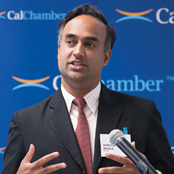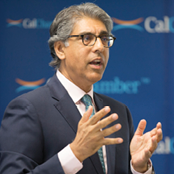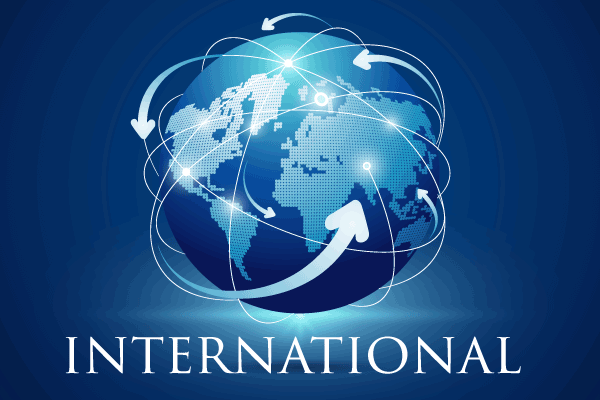The importance of trade and the ability of U.S. and California companies to compete more effectively in foreign markets was the topic discussed by three international trade experts at a recent international forum at the California Chamber of Commerce.
The May 31 forum, moderated by Susanne T. Stirling, CalChamber vice president of international affairs, brought together nearly 200 attendees, including representatives of the business community, higher education, CalChamber Board members, representatives of the California consular corps and foreign economic partners, plus representatives of state, local and federal governments.
Update from GO-Biz

Panorea Avdis, director of the Governor’s Office of Business and Economic Development (GO-Biz), spoke first, telling the crowd, “We can all agree that what makes California great is the diversity of the people who set out to do the things other people might say are impossible.”
Avdis explained that California is a global community hub that inspires people from abroad not only to study or work here, but to travel here.
According to Visit California, in 2016, California had more than 17 million visitors. As the agency’s motto states: “all dreams welcome.” Avdis affirmed that this is the mindset that drives “California risk takers, disrupters and entrepreneurs who are working on the next big thing that will change the world.”
California continues to be a leader because of two important factors: its people and the state’s access to international markets.
GO-Biz is helping to position students, engineers, scientists and innovators for global opportunities that leverage “their ingenuity, creativity for the benefit of our state and our world,” Avdis said.
GO-Biz manages a variety of programs, but Avdis highlighted the Strong Workforce Initiative, which helps create pathways that ensure California’s labor force is “ready today for tomorrow’s demands.”
In addition, GO-Biz has 14 regional innovation hubs, which helps each participating area develop strategies that will lead to high wage, high growth jobs that will help attract foreign direct investment and market products and services abroad.
As the sixth largest economy in the world, California competes around the globe. To strengthen the state’s position for California businesses, Governor Edmund G. Brown Jr. has signed eight Memorandums of Understanding (MOUs) with nation states that specifically speak to trade and investment.
While these activities set the framework for California’s businesses to compete, this is just one side of the equation, Avdis said. GO-Biz will be accepting applications for the State Trade Expansion Program (commonly referred to as California STEP), which is designed to drive export capacities for small businesses.
“The goals are simple, Avdis said. “If you’re exporting, we want to help you export more and if you’re not exporting, we’d like to help you get started.”
California STEP leverages a statewide network of state, federal, private and nonprofit trade promotion organizations to facilitate export promotion activities serving targeted industries, to increase the number of California small businesses that are exporting and increase the dollar value of exports by those small businesses.
Finally, Avdis introduced the group to GO-Biz’s newest deputy director of international affairs and business development, Awinash Bawle.

Bawle said he is “the enthusiastic and energetic global, two-way salesman-in-chief for the Golden State.”
The goal of the international affairs team is to help California’s private sector businesses by doing all the team can to help attract as much inward international investment as possible and expand as many export opportunities as possible.
For more information on GO-Biz resources, visit www.business.ca.gov.
U.S. Trade Issues

Christopher Wenk, executive director of international policy with the U.S. Chamber of Commerce, pointed out that 41 million American jobs depend on international trade. U.S. exports have seen a 50% growth between 2009 and 2014, led by exports to Mexico and Canada.
“Our free trade agreements have been a big opportunity for U.S. exporters,” Wenk said.
Worldwide there has been a proliferation of trade agreements and this expansion does not include the U.S.
“Everybody else is moving forward and from our perspective we should be more aggressive,” Wenk said.
The next area which is front and center for trade is the North American Free Trade Agreement (NAFTA), between the U.S., Canada and Mexico, comprising 484.3 million people. Combined annual trade with the United States was around $1.069 trillion in 2016. In 2016, goods exports topped $496.919 billion while goods imports totaled nearly $572.217 billion.
Trade Update and Outlook: A View from Washington (PowerPoint Slideshow)
Wenk explained that on May 18 the Trump administration sent a notification letter to Congress that it intends to open trade talks with Canada and Mexico in an attempt to renegotiate NAFTA. Wenk estimates that negotiations will begin in the late summer.
He also speculated that the road ahead on trade negotiations in general will go through this NAFTA negotiation first.
Clearly there is some skepticism about trade and whether the United States should move forward, Wenk explained, but it is critical that small and medium companies share their success stories.
The U.S. Chamber of Commerce launched a website in 2017 to serve as a one-stop shop for national and state-specific trade information, survey results, and advocacy tools—www.tradeworksforus.com.
Trade in the Americas

Globally, trade is at a very interesting juncture, Ambassador Jamal Khokhar, president and CEO from the Institute of the Americas, said to the forum attendees.
For more than the last half century, the U.S. has led the world in breaking down barriers to trade and in creating a fairer and freer international trading system based on market economics and the rule of law. Increased market access achieved through trade agreements has played a major role in the nation’s success as the world’s leading exporter.
This trend is changing, however, to a more inward view because “large segments of the population have not necessarily benefitted from the gains of trade liberalization that were promised them in the trade agreements,” the Ambassador said.
Ambassador Khokhar explained that it is not the trade agreement’s fault for this predicament. “We are better off with a liberalized trade agenda,” he said. The challenge instead is how to make the trade adjustments in terms of education, job training, job creation, adjusting with new technologies, recognizing that some manufacturing jobs will be lost and new ones created and there’s a balance between the two sides.
Why are trade agreements so difficult to negotiate? the Ambassador asked rhetorically.
“Trade agreements are the only instrument that oblige countries to internalize, ratify into domestic law the agreements reached among countries. So, they are enforceable and there are dispute resolution systems in place,” he said.
It is this package deal that allows countries to load up a variety of topics and problems into a trade agreement. However, the biggest change in trade is new technology, and that is presenting a whole host of new problems.
Global value chains account for 80% of world trade today. Global value chains are companies selling to each other, within the company, or all the people and all the goods from around the world that go into the production of a product or a service.
“In a world where goods, or even cattle cross the border before they’re processed and delivered…how do you define a rule of origin?” Ambassador Khokhar asked. “So global value chains are extremely important and yet our trade agreements are not set up any longer to deal with sophisticated global value chains.”
The debate the world is having about trade and whether it benefits or hurts countries needs to refocus on how technology changes everything.
The Ambassador sympathized that there are people who are hurt, who have lost jobs and explained that we as a society, not necessarily just government, need to think of how to address that and we need to think about how to retrain and create new jobs in some of these new companies.
“Look backwards if you want to, but I think the rest of the world is moving on and I think countries like the U.S. and key states like California control a lot of global leadership,” Ambassador Khokhar said in closing.
Export Achievement Certificate
CalChamber member company Gliding Eagle was awarded the U.S. Department of Commerce Export Achievement Certificate. Company founder and CEO Jack Duan was given the award by Tom McGinty, national director, U.S. and Foreign Commercial Service, and Rod Hirsch, director of the Oakland Export Assistance Center.
Gliding Eagle has developed a fully traceable direct-to-consumer logistics solution using FedEx to connect premium California wineries with Chinese consumers, in both mainland China and Hong Kong.
The Export Achievement Certificate was created to recognize small and medium-sized enterprises that have successfully entered the international marketplace for the first time or that have successfully entered a new market.


